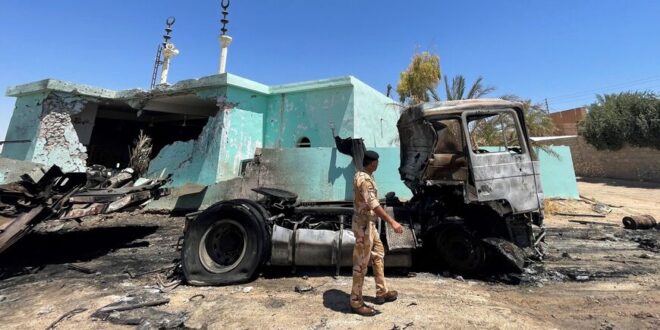The Pentagon says it is taking a recent spate of drone and rocket attacks “deadly seriously.”
Pentagon officials are monitoring the situations in Iraq and Syria with “great concern” after at least five rocket and drone attacks targeted sites used by US personnel in the two countries this week.
“You’ve seen us retaliate appropriately when that safety and security has been threatened,” Pentagon spokesman John Kirby told reporters Thursday.
Three rockets landed near the US Embassy in Baghdad’s Green Zone on Thursday in the latest such incident. No one was reported to have been hurt, but Wednesday two US military personnel were left with what officials described as minor injuries after some 14 rockets slammed into al-Asad Airbase in Iraq’s Anbar province.
The spate of attacks comes just over a week after President Biden authorized precision airstrikes against Iran-linked militia positions in Iraq and Syria for the second time during his presidency. The strikes, which killed four militia members, were designed to end the tit-for-tat violence. They have so far failed to do so.
Small-scale rocket attacks by suspected Iran-backed militias on US positions in Iraq have become commonplace since the Trump administration withdrew from the 2015 nuclear agreement with Tehran and reapplied economic sanctions in a bid to isolate the Islamic Republic.
“These attacks are using lethal weaponry,” Kirby said, adding, “We take each one of these deadly seriously.”
Both Kataib Hezbollah and Asaib Ahl al-Haq issued statements denying involvement in Thursday’s attack on the embassy. Yet the recent uptick in barrages follows renewed bellicose rhetoric from pro-Iran faction leaders. Hadi al-Amiri, head of the pro-Iran Fatah bloc in Iraq’s parliament, praised recent attacks, and credited such attacks as having played a role in last year’s US troop reductions in the country.
Roughly 2,500 US troops remain in Iraq and 900 in Syria, according to official numbers. Their purpose is to ensure stability and assist local security forces as they hunt down the remaining members of the Islamic State.
Facing conflicting pressures in Congress over presidential war powers and indirect negotiations with Iran to reenter the nuclear deal, the Biden administration has avoided rushing to attribute blame for the attacks.
Administration officials have vowed to hold Iran accountable for the actions of the militias it sponsors throughout the region. Last week, The Washington Post reported that US officials had lowered the threshold required to retaliate for such attacks.
“The US should be consistent in responding to attacks by Iranian-backed militia against our forces in Iraq,” said Mick Mulroy, a former CIA station chief turned ABC News analyst.
“Iran needs to know they can’t hide behind their proxy forces, especially when they injure Americans,” Mulroy said.
Yet Iraqi political opposition to US strikes and the militias’ pressure on Prime Minister Mustafa al-Kadhimi have left the Biden administration with few easy options.
One method to help deter future attacks, Mulroy suggested, would be for the United States to retaliate by only striking targets in Syria to “avoid the political issues that may result from responding in Iraq.”
But recent US strikes on both sides of the border have spurred retaliation against American forces in both countries.
Biden has now twice authorized strikes near the Syrian border crossing at Qaim, the Iran-backed militias’ primary land route into Syria, where they support President Bashar al-Assad.
Last month’s strikes resulted in an apparent retaliatory attack against US forces at Syria’s al-Omar oilfield nearby. Unburdened by local political concerns, US forces retaliated swiftly with artillery and at least one drone strike.
Nonetheless, an apparent drone attack on al-Omar reported by local Kurdish militias Wednesday suggests the militias may continue to target US forces in both countries.
Kadhimi is due in Washington later this month to continue discussions with American officials, including on the future of the US troop presence in his country.
 Eurasia Press & News
Eurasia Press & News


